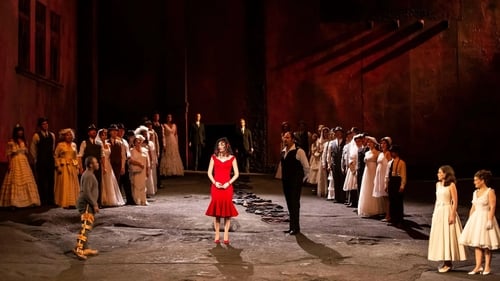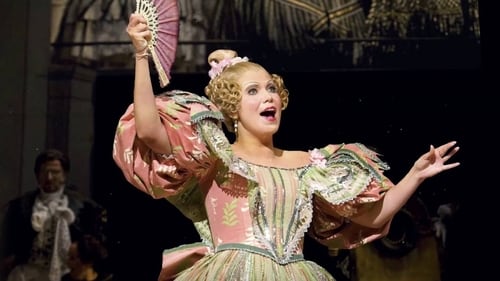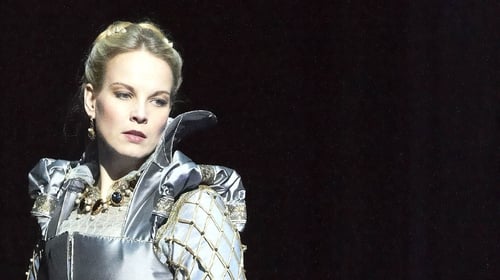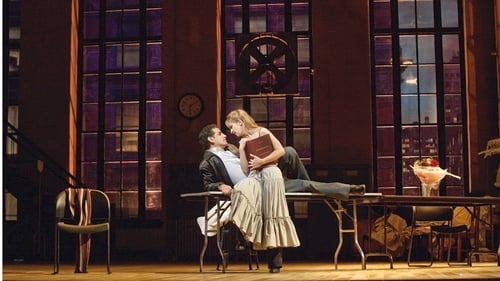Evelino Pidò
略歴
Evelino Pidò recieved his musical training at the Conservatoire in Turin and took courses for orchestral conducting at the Musikhochschule in Vienna. His international career began with the opening of the Three Worlds Festival in Melbourne with Madama Butterfly; it was followed by conducting engagements at the Sydney Opera House. In 1993 Evelino Pidò gave his debuts at the Santa Fe Festival in America, at the Los Angeles Opera and the Royal Opera House in London. Other engagements have taken him to the festival in Aix-en-Provence, at the Opéra Bastille in Paris, the Metropolitan Opera in New York, at the Théâtre des Champs-Elysées in Paris, the Opéra National de Lyon and the Grand Théâtre in Geneva. At the Royal Opera House, he conducted La cenerentolaand Lucia di Lammermoor, at the Teatro Real La gioconda and at the Met La sonnambula. He collaborates with numerous renowned orchestras including the Royal Philharmonic Orchestra in London, the Orchestre de la Suisse Romande and many others. In 2011, he gave his debut at the Vienna State Opera with La Sonnambula. Further performances at the house on the ring include Anna Bolena, Roberto Devereux, Simon Boccanegra and Adriana Lecouvreur. http://www.wiener-staatsoper.at/Content.Node/home/kuenstler/dirigenten/Pido.en.php

Conductor
First seen in Naples in 1827, this farce of a “theatre within a theatre” narrates the mishaps of a second-rate opera company as it stages the great serious drama Romolo ed Ersilia in a provincial theatre. The unbearable tensions between the two lead singers are finally resolved with the decisive intervention of one of their mothers. The co-production by Ópera de Lyon along with the Grand Theâtre de Genève and Teatro Real is brought to life by Laurent Pelly, a tireless champion of Donizetti's comedies.

Conductor
Royal Opera favourite Bryn Terfel heads the cast for this new production of Donizetti’s comedy of domestic drama across two generations. The witty story of a middle-aged man whose supposed young wife runs rings around him – with her own ulterior romantic purpose in mind – has long delighted and surprised audiences, not least as presented with the sparkle of its music and the virtuoso skill of its performers. Damiano Michieletto’s exhilarating production shows how contemporary the characters still are and how immediate and touching the story remains.

Conductor
Divested of its traditional attributes – glass slipper and pumpkin carriage – and dominated by a tyrannical stepfather instead of a cruel stepmother, Rossini’s la Cenerentola plays with these most conventional of fairy‑tale characters. Nonetheless Cinderella lives in a closed world devoid of tenderness and under the yoke of the tormentor whom she protects. Deep beneath her goodness smoulders a fire that her encounter with the prince will set free… Guillaume Gallienne subtly highlights the halftones of this dramma giocoso, somewhere between opera buffa and opera seria, and ranging from sombre melancholy to the burlesque.

Conductor
Divested of its traditional attributes – glass slipper and pumpkin carriage – and dominated by a tyrannical stepfather instead of a cruel stepmother, Rossini’s la Cenerentola plays with these most conventional of fairy‑tale characters. Nonetheless Cinderella lives in a closed world devoid of tenderness and under the yoke of the tormentor whom she protects. Deep beneath her goodness smoulders a fire that her encounter with the prince will set free… Guillaume Gallienne subtly highlights the halftones of this dramma giocoso, somewhere between opera buffa and opera seria, and ranging from sombre melancholy to the burlesque.

Conductor
First performed in Paris in 1843, at the turning point of several eras, Don Pasquale, a composite and varied work, is the apotheosis of opera buffa. Performed for the first time at the Paris Opera, the production has been entrusted to the Italian director, Damiano Michieletto, who transports us directly to the sincerity and dramatic splendour at the heart of an apparently light‑hearted work.

Conductor
First performed in Paris in 1843, at the turning point of several eras, Don Pasquale, a composite and varied work, is the apotheosis of opera buffa. Performed for the first time at the Paris Opera, the production has been entrusted to the Italian director, Damiano Michieletto, who transports us directly to the sincerity and dramatic splendour at the heart of an apparently light‑hearted work.

Conductor
“Foolish indeed is he who marries in old age.” Thus ends Don Pasquale: with a wise dictum not lacking in irony that sums up the disappointments of its hero, a rich bachelor keen to marry who is deceived by his nephew Ernesto and his young bride-to-be Norina. First performed in Paris in 1843, at the turning point of several eras, Don Pasquale, a composite and varied work, is the apotheosis of opera buffa. Performed for the first time at the Paris Opera, the production has been entrusted to the Italian director, Damiano Michieletto, who transports us directly to the sincerity and dramatic splendour at the heart of an apparently light‑hearted work.

Music Director
An outsider—a hunchbacked jester—struggles to balance the dueling elements of beauty and evil that exist in his life.

Director
A bel canto jewel and one of the most technically-challenging operas of the repertoire found its dream team in 2016 at the Teatro Real de Madrid with the incredible soprano Diana Damrau as Elvira, Javier Camarena as Arturo, Ludovic Tézier as Sir Riccardo Forth, and Nicolas Testé as Sir Giorgio. The Spanish stage director Emilio Sagi’s setting of I Puritani is somber and elegant, a perfect match for the excellent musical direction of Evelino Pidò, one of the great interpreters of this repertoire.

Conductor
The great storyteller Hoffmann is losing himself to drink. His rival in love, Councillor Lindorf, claims that Hoffmann knows nothing of the heart, and so goads Hoffmann into telling the tales of his three great loves – each destroyed by a villain who bears an uncanny resemblance to Lindorf… First Hoffmann tells of his infatuation for the mechanical doll, Olympia – who is destroyed by the inventor Coppélius. Next comes the courtesan Giulietta, who throws over his adoration in favour of jewels from the magician Dappertutto. Finally, the gentle Antonia is forced to sing to her death by the wicked Doctor Miracle. His stories finished, Hoffmann rouses from his drunken stupor to find Lindorf has made off with Stella, Hoffmann’s latest love – but the Muse compels him to transform his heartache into art.

Conductor

Conductor
Gaetano Donizetti and his librettist Felice Romani kept the focus of their opera ANNA BOLENA on the personal rather than the political in this fictionalized Tudor tale: Henry VIII of England wants to get rid of his second wife, Anne Boleyn, so that he can marry her lady-in-waiting, Jane Seymour. He brings Lord Richard Percy, Anne's first love, back from exile so that he can find an excuse to accuse her of adultery. With the unwitting aid of Smeaton, a court musician, and Lord Rochefort, Anne's brother, the trap is easily sprung. This 2011 live recording from the Wiener Staatsoper showcases Anna Netrebko as she "scored a personal triumph" in her debut as the hapless Tudor Queen, while her stage partners - notably Elīna Garanča as Jane Seymour and Ildebrando D'Arcangelo as Henry VIII - were likewise showered with critical acclaim.

Music Director
Gaetano Donizetti and his librettist Felice Romani kept the focus of their opera ANNA BOLENA on the personal rather than the political in this fictionalized Tudor tale: Henry VIII of England wants to get rid of his second wife, Anne Boleyn, so that he can marry her lady-in-waiting, Jane Seymour. He brings Lord Richard Percy, Anne's first love, back from exile so that he can find an excuse to accuse her of adultery. With the unwitting aid of Smeaton, a court musician, and Lord Rochefort, Anne's brother, the trap is easily sprung. This 2011 live recording from the Wiener Staatsoper showcases Anna Netrebko as she "scored a personal triumph" in her debut as the hapless Tudor Queen, while her stage partners - notably Elīna Garanča as Jane Seymour and Ildebrando D'Arcangelo as Henry VIII - were likewise showered with critical acclaim.

Conductor
Just as a young woman is about to marry her sweetheart, she is discovered—by the entire village, to say nothing of her fiancé—asleep in the bedroom of a stranger. It takes the young man two acts to figure out that sleepwalking is to blame, and everything ends happily. Natalie Dessay as Amina and Juan Diego Flórez as Elvino deliver bel canto magic and vocal fireworks in Mary Zimmerman’s 2009 production. The Tony award-winning director transfers Bellini’s bucolic tale to a rehearsal room in contemporary New York, where an opera company rehearses La Sonnambula—and where the singers are truly in love with each other.

Director
L'elisir d'amore (The Elixir of Love) is a comic opera (melodramma giocoso) in two acts by the Italian composer Gaetano Donizetti. Felice Romani wrote the Italian libretto, after Eugène Scribe's libretto for Daniel Auber's Le philtre (1831). Written in haste in a six-week period,[1] L'elisir d'amore was the most often performed opera in Italy between 1838 and 1848[1] and it has remained continually in the international opera repertory. Today it is one of the most frequently performed of all Donizetti's operas: it appears as number 13 on the Operabase list of the most-performed operas worldwide in the five seasons between 2008 and 2013.[2] There are a large number of recordings. It contains the popular tenor aria "Una furtiva lagrima," a romanza that has a considerable performance history in the concert hall.








